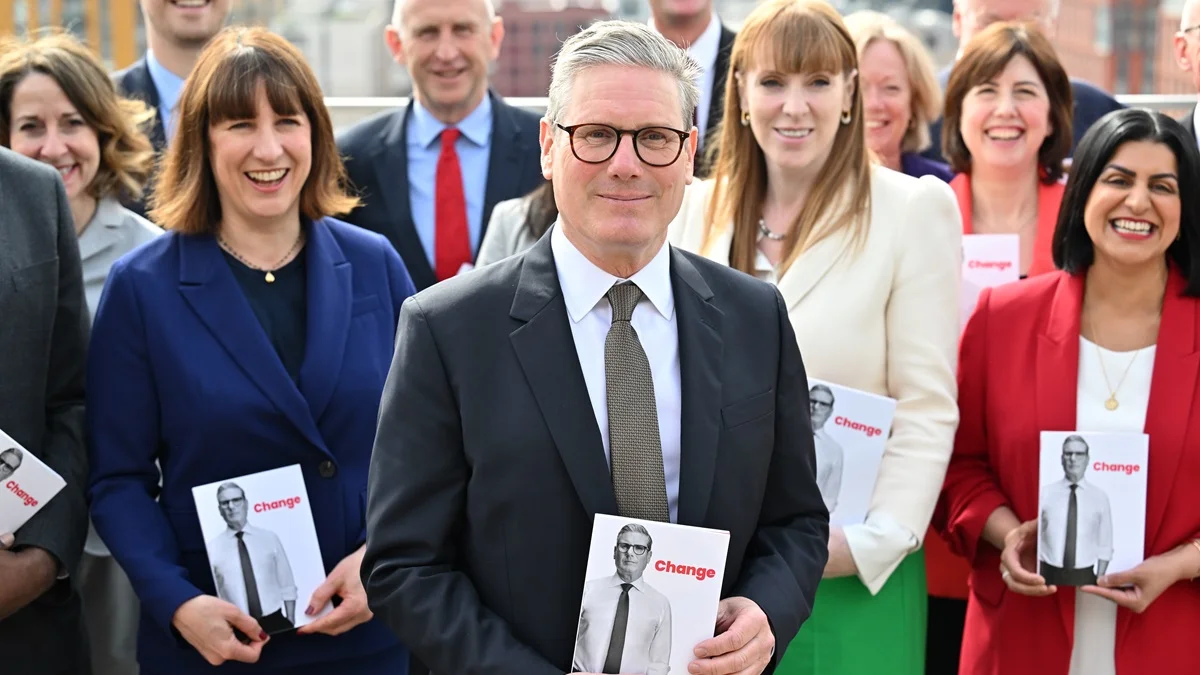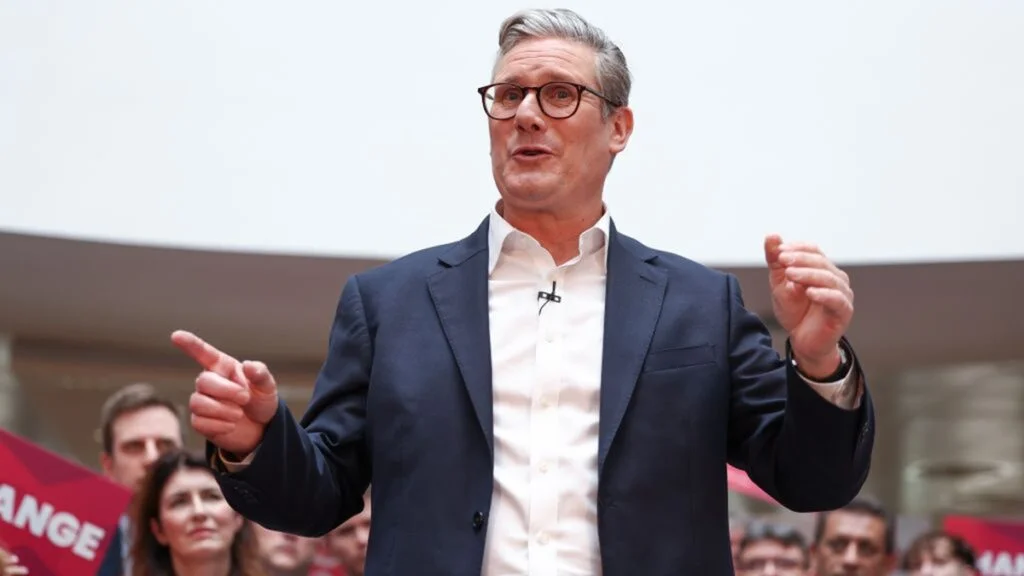
Sir Keir Starmer does not look like a gambler. The Labour Party's election strategy is to pitch him as an everyman – someone who likes football, goes for drinks down the pub and can be trusted to roll up his sleeves and get on with the job without drama.
Sometimes this works against him. One of his most difficult moments in the election campaign so far came when he was derided as a "political robot" by an audience member during a televised debate, a barb that briefly left him lost for words. But underpinning Labour's manifesto and the party's plans for the next five years is a huge political and fiscal risk: Starmer and Rachel Reeves, the shadow chancellor, are betting the house on growth.
On current forecasts, Britain's growth is anaemic. Economists have pointed out that this will lead to five years of tax rises and spending cuts, whoever wins the election. Starmer's response to these warnings has been to go on the offensive. The economists, he argued at Labour's manifesto launch, are fundamentally wrong.
“This manifesto is a total rejection of that defeatist approach that the only levers are tax and spend,” he said. “I understand that after 14 years of this, for many people the hope has been beaten out of them. But this is a manifesto for hope, a plan for growth and wealth creation. I will never accept the defeatism that says we can never do better than this. We can, we will.”
Cynicism. Defeatism. The absence of hope. Starmer is going for pure boosterism in an approach that, at least in terms of rhetoric, has more in common with Liz Truss and Boris Johnson.
The question for Labour is how it will achieve that growth given the severity of the fiscal constraints it is facing. In its quest for credibility, Labour has signed up to all the Conservative Party's fiscal rules, including getting debt falling as a proportion of GDP over the course of this parliament. But Ed Balls, the former shadow chancellor, has warned of the risk that these rules become a "straitjacket", making life incredibly difficult for Labour if it wins the general election.
Labour is relying predominantly on supply-side measures, such as a huge overhaul of planning rules, to get the economy moving. Plans to invest £28bn a year in green technology have been scaled back, while economists have pointed out that other measures, such as a £7.3bn national wealth fund to attract private investment, are laudable but not on the scale seen in other countries.
Given that Labour's ambition is to secure the highest level of sustainable growth in the G7, some party insiders are privately questioning whether its current policy offer is sufficient. If it falls short, the party will have difficult choices to make on both tax and spending. Labour has already adopted Tory plans to increase public spending by just 1 per cent, an approach that would mean significant cuts to unprotected departments. At the same time, the party has said it will retain Tory plans to freeze income tax thresholds, which will see millions of people dragged into paying higher rates of tax by 2027-28.
Given that Starmer has ruled out a return to austerity, tax rises appear to be a realistic possibility as Labour seeks to balance the books. That means tax has become the central attack line for Rishi Sunak and the Conservatives as they seek to revive their flagging campaign.
Labour is doing its best to neutralise them. Starmer has explicitly ruled out raising what Labour describes as taxes on workers: national insurance, income tax and VAT. But on other areas of taxation, Labour appears to be giving itself room for manoeuvre.
It has adopted a deliberately opaque formula to respond to questions over its tax plans, saying there is nothing in Labour's manifesto that would require tax rises beyond those it has already announced. It gives Labour the space to adopt a different approach when it enters government. For example, it has refused to rule out increasing capital gains tax on the sale of assets such as shares and homes, revaluing council tax bands for the first time since 1991, increasing national insurance for employers or raising fuel duty.
Senior figures in the party argue privately that they have no intention of raising additional taxes. But one of the great truisms of politics is that while nobody pledges tax rises in their manifestos, they usually come in the aftermath of an election.
The Tories need their attacks on Labour over tax to work after a so-far disastrous campaign. From the off Sunak has been beset by challenges, many of his own making – a torrential downpour when he announced the election, a spectacular own-goal over D-Day, the return of Nigel Farage to frontline politics and the election date betting scandal.

The party's policies are also failing to cut through. The Tory manifesto included plans for £17bn worth of tax cuts alongside new pledges including compulsory national service for 18-year-olds, income tax cuts for pensioners and scrapping ‘Mickey Mouse’ degrees. While many of these polled well individually, voters do not appear to be listening. Labour's lead in the polls remains north of 20 per cent.
The Tories are facing what increasingly feels like an existential crisis, with polls suggesting they could be reduced to as few as 140 MPs. The atmosphere in Conservative Campaign Headquarters is said to be dire, with fears that the Tories could become a "zombie party" without the MPs or funding to form an effective opposition.
As the campaign enters its final 10 days, the Tories are adopting a two-pronged approach. The first is to highlight claims about Labour's tax plans at every opportunity. "It's tax, tax, tax," one senior party source said. "Don't expect to hear anything else from us."
The second is one borne of the dire situation the Tories find themselves in. In a bid to galvanise its core vote, the party has taken to warning that Labour is on course for a supermajority that could leave the Conservative Party with as few as 57 seats. Imagine what Starmer will do with 10 years of unchecked power, the Tories say. He will turn Britain into a "socialist state" by changing the rules and giving those aged 16 and 17 the vote, creating an "elective dictatorship".
It is an approach that carries inherent risks, not least because it assumes that the Tories are heading for defeat and that their plan is now one of "damage limitation". However, the hope is that this will galvanise the Tories’ core vote enough to get the party close to 200 MPs, which would still hand Labour a significant majority but avoid outright decimation.
Make no mistake, the Tories are facing a potential generational event. Grant Shapps, the defence secretary, went so far as to say the "quiet bit" out loud: that the Tories are unlikely to win the general election. While undoubtedly true, a Cabinet minister publicly admitting it is highly unusual.
Such is the scale of the wipeout facing the Conservative Party that many of those who have ambitions to succeed Sunak are facing a huge fight just to hold onto their own seats, even though they are sitting on majorities of between 10,000 and 20,000. What were once considered safe seats are now potential Labour targets, meaning a succession of "big beasts" could fall come 5 July.
Among Tory candidates, there is little sympathy for Sunak. "I don't want him anywhere near my seat," said one in a red wall area. "I'm about to lose my job and everything I've worked for. He's been a total disaster."
Steven Swinford is the political editor of The Times.
Related and recommended
Richard Harpin, the founder of HomeServe and Growth Partner and owner of Business Leader, answers your burning business questions
Contestants from The Apprentice reveal the fundamental business lessons they learned from taking part in the TV show
From global talent pools to AI-powered documentation, a work-from-anywhere model is a new way of thinking about productivity, innovation and teamwork
The story of how cycling brought Business Leader member John Readman together with his co-founder and investors




